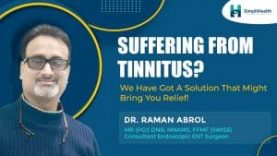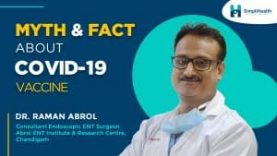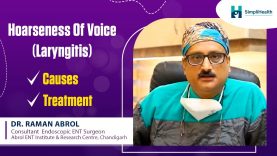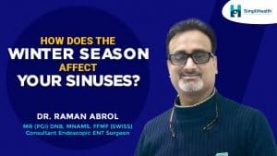Sinus Infection Treatment | Sinusitis | साइनस का परमानेंट इलाज | How Does the Winter Season Affect Your Sinuses?
- 1.82K
- 4 years ago
Dr. Raman Abrol
Dr. Raman Abrol
Sinus Infection Treatment | Sinusitis | साइनस का परमानेंट इलाज | साइनसाइटिस कारण लक्षण व उपचार | साइनस को हमेशा के लिए कैसे ठीक करें? | क्या साइनस जड़ से खत्म हो सकता है? | 5 Symptoms of Sinus Infection
Sinus infection treatment, Dr. Raman Abrol, an Otorhinolaryngologist at Abrol ENT Institute and Research Centre, Chandigarh, explains the symptoms, causes, and suggests prevention and treatment of sinus infections sinusitis.
What is sinus or sinusitis?
Sinusitis is a condition in which the nasal passages’ cavities become inflamed. Acute sinusitis can be triggered by a few reasons, one of them being cold or allergies. On the other hand, Chronic sinusitis lasts up to eight weeks and may be caused by an infection or growth and severe headache.
According to him, Winter is harsh weather as far as sinus infections are concerned. It is harsh for regular individuals and susceptible individuals, especially the extremes of ages like children or the older adults or the people suffering from chronic diseases.
What are the causes of sinusitis?
Dr. Abrol points out out significant factors that are the cause of Sinusitis during these months;
- The first most important is the cold temperature itself. When the individual is outside, the nose reacts. There is a lot of congestion and a lot of secretions in the nose, and this congestion and swelling can cause the sinuses to block and cause sinusitis.
- The second important factor is that most people use dry heaters inside the room during these months. The dry heaters can cause severe drying of the air inside the room and cause dryness in the mouth, nose, and crusting, which can block and cause sinusitis.
- The third thing is that the viruses are rampant during this period, especially influenza in the family, so the susceptible individual can easily contract the virus infection. Or the thing is that there are certain allergens, especially in this weather there are certain plants and trees that pollinate in this weather, susceptible individuals who are allergic can severe attacks of allergies, and that turns into sinusitis.
How can sinusitis be prevented?
As an ENT surgeon, Dr. Abrol recommends few things to be done during this period to prevent sinus infection.
Wear adequate clothing: Sinus Infection Treatment
Number one is to keep ourselves warm adequately with adequate clothing. One must avoid inevitable exposure to temperatures like we go suddenly out of a dry heated room outside or come from outside suddenly into the dry heated room, so the sudden shift in temperature can alter the nose’s reaction and can cause Sinusitis.
Keep hydrated:
One must have adequate hydration, must have plenty of fluids to drink, must have a lot of water to drink, and must have a nutritious diet during this period.
Adequate ventilation: Sinus Infection Treatment
The other thing is that the rooms where we live must have adequate ventilation or at least intermittently you must allow the normal fresh air to come inside the room which will prevent this dryness.
Avoid the allergies from flaring up: Sinus Infection Treatment
The fourth thing is that the individuals who had allergies or have to treat the allergies during this period adequately must prevent any further flare-app of allergies to avoid sinusitis.
Steam inhalations:
The fifth thing is that when all the people are living inside of staying inside the heated rooms, they must have saline nasal sprays very frequently, especially 4-5 times a day, or maybe they can take steam inhalations from time to time during a day to moisten up the nose and keep the humidity intact inside the nose to prevent Sinusitis.
Bottom line: Sinus Infection Treatment
The final thing that Dr. Abrol recommends is that despite everything, if an individual still contracts the Sinus infection in the form of headache, in the form of nasal congestion, blockage, nasal secretions, nasal discharge, one must consultant ENT doctor and not resort to over the counter medication or self-medication.










Comments (0)